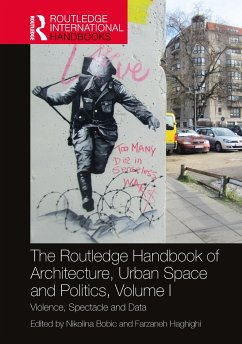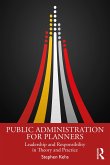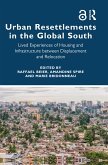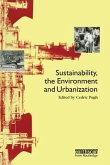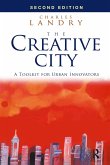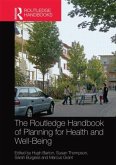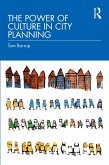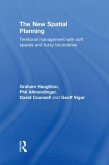The Routledge Handbook of Architecture, Urban Space and Politics, Volume I
Violence, Spectacle and Data
Herausgeber: Bobic, Nikolina; Haghighi, Farzaneh
The Routledge Handbook of Architecture, Urban Space and Politics, Volume I
Violence, Spectacle and Data
Herausgeber: Bobic, Nikolina; Haghighi, Farzaneh
- Gebundenes Buch
- Merkliste
- Auf die Merkliste
- Bewerten Bewerten
- Teilen
- Produkt teilen
- Produkterinnerung
- Produkterinnerung
This first volume of the handbook frame cutting-edge contemporary debates, and present studies of actual theories and projects that address spatial politics. This handbook provides comprehensive and multidisciplinary research focused on the complex nexus of politics, architecture and urban space.
Andere Kunden interessierten sich auch für
![Public Administration for Planners Public Administration for Planners]() Stephen KehsPublic Administration for Planners183,99 €
Stephen KehsPublic Administration for Planners183,99 €![Urban Resettlements in the Global South Urban Resettlements in the Global South]() Urban Resettlements in the Global South183,99 €
Urban Resettlements in the Global South183,99 €![Sustainability the Environment and Urbanisation Sustainability the Environment and Urbanisation]() Cedric PughSustainability the Environment and Urbanisation183,99 €
Cedric PughSustainability the Environment and Urbanisation183,99 €![The Creative City The Creative City]() Charles LandryThe Creative City236,99 €
Charles LandryThe Creative City236,99 €![The Routledge Handbook of Planning for Health and Well-Being The Routledge Handbook of Planning for Health and Well-Being]() The Routledge Handbook of Planning for Health and Well-Being295,99 €
The Routledge Handbook of Planning for Health and Well-Being295,99 €![The Power of Culture in City Planning The Power of Culture in City Planning]() Tom BorrupThe Power of Culture in City Planning183,99 €
Tom BorrupThe Power of Culture in City Planning183,99 €![The New Spatial Planning The New Spatial Planning]() Graham HaughtonThe New Spatial Planning236,99 €
Graham HaughtonThe New Spatial Planning236,99 €-
-
-
This first volume of the handbook frame cutting-edge contemporary debates, and present studies of actual theories and projects that address spatial politics. This handbook provides comprehensive and multidisciplinary research focused on the complex nexus of politics, architecture and urban space.
Produktdetails
- Produktdetails
- Verlag: Taylor & Francis Ltd (Sales)
- Seitenzahl: 610
- Erscheinungstermin: 30. November 2022
- Englisch
- Abmessung: 244mm x 170mm x 35mm
- Gewicht: 1197g
- ISBN-13: 9780367629175
- ISBN-10: 0367629178
- Artikelnr.: 64639660
- Verlag: Taylor & Francis Ltd (Sales)
- Seitenzahl: 610
- Erscheinungstermin: 30. November 2022
- Englisch
- Abmessung: 244mm x 170mm x 35mm
- Gewicht: 1197g
- ISBN-13: 9780367629175
- ISBN-10: 0367629178
- Artikelnr.: 64639660
Nikolina Bobic is an academic and an architect. After completing her PhD in Architecture at the University of Sydney (Australia), she moved to the UK and is now based at the University of Plymouth. Apart from her extensive experience in teaching in Australia, Hong Kong and the UK, Bobic has also given lectures in the Netherlands and New Zealand. Engaging with the two disciplines in which she is trained, architecture and sociology, her research addresses the intersections of power, politics, and space in their oppressive and liberatory mechanisms. Bobic is the author of Balkanization and Global Politics: Remaking Cities and Architecture (Routledge, 2019), and in 2020 she coedited Interstices: A Journal of Architecture and Related Arts thematic issue 20 'Political Matters'. Farzaneh Haghighi is a Senior Lecturer in Architecture at the School of Architecture and Planning, The University of Auckland, New Zealand. She holds a PhD in Architecture from The University of Sydney, Australia. Her research is concerned with the intersection of political philosophy, architecture and urbanism, and her first book, Is the Tehran Bazaar Dead? Foucault, Politics, and Architecture, was published in 2018. Her research seeks new avenues to enrich our creative analysis of complex built environments through investigating the implications of critical and cultural theory for architectural knowledge.
PART I: Introduction
1. Spatialization of oppression: Contemporary politics of architecture and
the urban
NIKOLINA BOBIC & FARZANEH HAGHIGHI
PART II: Violence and War Machines
2. Introduction to violence and war machines
WILLIAM M. TAYLOR
3. The rise of zoöpolitics: On urbanism and warfare
LIEVEN DE CAUTER
4. 2015 Paris Terrorist Attack: A threat to urban life and territorial
integrity
JOHN HANNA
5. Whose vision, which city? Planning and unseeing in urban Asia
REDENTO B. RECIO, ISHITA CHATTERJEE, LUFTUN NAHAR LATA & NEERAJ DANGOL
6. Architecture as Infrastructure: The spatial politics of extractivism
HÉLÈNE FRICHOT & SEPIDEH KARAMI
7. Manus prison: The brutality of offshore detention
DANIEL GRINCERI
PART III: Security and Borders
8. Introduction to security and borders
ANOMA PIERIS
9. Dialogic dilemmas: Citizen participation in built environment
alterations in Malmö, Sweden
GUNNAR SANDIN
10. Regenerating Shanghai through urban spatial design? The limits to
experimentalism and participation
YUNPENG ZHANG & WEILUN ZHANG
11. The city and the camp: Destabilizing a spatial-political dichotomy
IRIT KATZ
12. Architectures of motion at the US Mexico border
THOMAS NAIL
13. Belfast's 'peace walls': How the politics and policy of 1969-1971
shaped the city's contemporary 'interface areas'
JAMES O'LEARY
PART IV: Race, Identity and Ideology
14. Introduction to race, identity and ideology
STEPHEN F. GRAY & ANNE LIN
15. The Space of Labor - Racialization and ethnicization of Port Kembla,
Australia
MIRJANA LOZANOVSKA
16. The Audit: Perils and possibilities for contesting oppression in the
heritage landscape
CATHERINE D'IGNAZIO, WONYOUNG SO & NICOLE NTIM-ADDAE
17. The Persistent design-politics of race: Power and ideology in American
public housing redevelopment
LAWRENCE VALE
18. The Socialist past is a foreign country: Mass housing and uses of
heritage in contemporary Eastern Europe
MARO KRIVÝ
19. Collectivity and privacy in housing: Path dependencies and limited
choices
TAHL KAMINER
PART V: Spectacle and the Screen
20. Introduction to spectacle and the screen
FRANCESCO PROTO
21. A 'Crisis' of indeterminacy in the architectural photograph:
Architectural spectacle and everyday life in the photography of Lacaton &
Vassal's Coutras House
ROBIN WILSON
22. Mediated spectacles: Urban representation and far-right propaganda in
crisis Athens
AIKATERINI ANTONOPOULOU
23. Street protest and its representations: Urban dissidence in Iran
FARZANEH HAGHIGHI
24. Western fantasy and tropical nightmare: Spectacular architecture and
urban warfare in Rio
PEDRO FIORI ARANTES & CLÁUDIO REZENDE RIBEIRO
25. The political construction of Medellín's global image: Strategies of
replacement, erasure and disconnection via urban and architectural
interventions
CHRISTINA DELUCHI
PART VI: Mapping Landscapes and Big Data
26. Introduction to mapping landscapes and big data
ATE POORTHUIS
27. The socio-cultural construction of urban wasteland: Mapping of the
Antwerp Southside
CECILIA FURLAN & MANOLA COLABIANCHI
28. Brownfields as climate colonialism: Land reuse and development divides
SHILOH KRUPAR
29. The bomb, the circle and the drawing undone
ENDRIANA AUDISHO & FRANCESCA HUGHES
30. Infrastructures of urban simulation: Digital twins, virtual humans and
synthetic populations
FARZIN LOTFI-JAM
31. Posthuman urbanism: datafication, algorithmic governance, and Covid-19
IGNAS KALPOKAS
PART VII: CONCLUSION
32. Intermission: Critical mapping of spatial politics and aesthetics
STEPHEN WALKER
1. Spatialization of oppression: Contemporary politics of architecture and
the urban
NIKOLINA BOBIC & FARZANEH HAGHIGHI
PART II: Violence and War Machines
2. Introduction to violence and war machines
WILLIAM M. TAYLOR
3. The rise of zoöpolitics: On urbanism and warfare
LIEVEN DE CAUTER
4. 2015 Paris Terrorist Attack: A threat to urban life and territorial
integrity
JOHN HANNA
5. Whose vision, which city? Planning and unseeing in urban Asia
REDENTO B. RECIO, ISHITA CHATTERJEE, LUFTUN NAHAR LATA & NEERAJ DANGOL
6. Architecture as Infrastructure: The spatial politics of extractivism
HÉLÈNE FRICHOT & SEPIDEH KARAMI
7. Manus prison: The brutality of offshore detention
DANIEL GRINCERI
PART III: Security and Borders
8. Introduction to security and borders
ANOMA PIERIS
9. Dialogic dilemmas: Citizen participation in built environment
alterations in Malmö, Sweden
GUNNAR SANDIN
10. Regenerating Shanghai through urban spatial design? The limits to
experimentalism and participation
YUNPENG ZHANG & WEILUN ZHANG
11. The city and the camp: Destabilizing a spatial-political dichotomy
IRIT KATZ
12. Architectures of motion at the US Mexico border
THOMAS NAIL
13. Belfast's 'peace walls': How the politics and policy of 1969-1971
shaped the city's contemporary 'interface areas'
JAMES O'LEARY
PART IV: Race, Identity and Ideology
14. Introduction to race, identity and ideology
STEPHEN F. GRAY & ANNE LIN
15. The Space of Labor - Racialization and ethnicization of Port Kembla,
Australia
MIRJANA LOZANOVSKA
16. The Audit: Perils and possibilities for contesting oppression in the
heritage landscape
CATHERINE D'IGNAZIO, WONYOUNG SO & NICOLE NTIM-ADDAE
17. The Persistent design-politics of race: Power and ideology in American
public housing redevelopment
LAWRENCE VALE
18. The Socialist past is a foreign country: Mass housing and uses of
heritage in contemporary Eastern Europe
MARO KRIVÝ
19. Collectivity and privacy in housing: Path dependencies and limited
choices
TAHL KAMINER
PART V: Spectacle and the Screen
20. Introduction to spectacle and the screen
FRANCESCO PROTO
21. A 'Crisis' of indeterminacy in the architectural photograph:
Architectural spectacle and everyday life in the photography of Lacaton &
Vassal's Coutras House
ROBIN WILSON
22. Mediated spectacles: Urban representation and far-right propaganda in
crisis Athens
AIKATERINI ANTONOPOULOU
23. Street protest and its representations: Urban dissidence in Iran
FARZANEH HAGHIGHI
24. Western fantasy and tropical nightmare: Spectacular architecture and
urban warfare in Rio
PEDRO FIORI ARANTES & CLÁUDIO REZENDE RIBEIRO
25. The political construction of Medellín's global image: Strategies of
replacement, erasure and disconnection via urban and architectural
interventions
CHRISTINA DELUCHI
PART VI: Mapping Landscapes and Big Data
26. Introduction to mapping landscapes and big data
ATE POORTHUIS
27. The socio-cultural construction of urban wasteland: Mapping of the
Antwerp Southside
CECILIA FURLAN & MANOLA COLABIANCHI
28. Brownfields as climate colonialism: Land reuse and development divides
SHILOH KRUPAR
29. The bomb, the circle and the drawing undone
ENDRIANA AUDISHO & FRANCESCA HUGHES
30. Infrastructures of urban simulation: Digital twins, virtual humans and
synthetic populations
FARZIN LOTFI-JAM
31. Posthuman urbanism: datafication, algorithmic governance, and Covid-19
IGNAS KALPOKAS
PART VII: CONCLUSION
32. Intermission: Critical mapping of spatial politics and aesthetics
STEPHEN WALKER
PART I: Introduction
1. Spatialization of oppression: Contemporary politics of architecture and
the urban
NIKOLINA BOBIC & FARZANEH HAGHIGHI
PART II: Violence and War Machines
2. Introduction to violence and war machines
WILLIAM M. TAYLOR
3. The rise of zoöpolitics: On urbanism and warfare
LIEVEN DE CAUTER
4. 2015 Paris Terrorist Attack: A threat to urban life and territorial
integrity
JOHN HANNA
5. Whose vision, which city? Planning and unseeing in urban Asia
REDENTO B. RECIO, ISHITA CHATTERJEE, LUFTUN NAHAR LATA & NEERAJ DANGOL
6. Architecture as Infrastructure: The spatial politics of extractivism
HÉLÈNE FRICHOT & SEPIDEH KARAMI
7. Manus prison: The brutality of offshore detention
DANIEL GRINCERI
PART III: Security and Borders
8. Introduction to security and borders
ANOMA PIERIS
9. Dialogic dilemmas: Citizen participation in built environment
alterations in Malmö, Sweden
GUNNAR SANDIN
10. Regenerating Shanghai through urban spatial design? The limits to
experimentalism and participation
YUNPENG ZHANG & WEILUN ZHANG
11. The city and the camp: Destabilizing a spatial-political dichotomy
IRIT KATZ
12. Architectures of motion at the US Mexico border
THOMAS NAIL
13. Belfast's 'peace walls': How the politics and policy of 1969-1971
shaped the city's contemporary 'interface areas'
JAMES O'LEARY
PART IV: Race, Identity and Ideology
14. Introduction to race, identity and ideology
STEPHEN F. GRAY & ANNE LIN
15. The Space of Labor - Racialization and ethnicization of Port Kembla,
Australia
MIRJANA LOZANOVSKA
16. The Audit: Perils and possibilities for contesting oppression in the
heritage landscape
CATHERINE D'IGNAZIO, WONYOUNG SO & NICOLE NTIM-ADDAE
17. The Persistent design-politics of race: Power and ideology in American
public housing redevelopment
LAWRENCE VALE
18. The Socialist past is a foreign country: Mass housing and uses of
heritage in contemporary Eastern Europe
MARO KRIVÝ
19. Collectivity and privacy in housing: Path dependencies and limited
choices
TAHL KAMINER
PART V: Spectacle and the Screen
20. Introduction to spectacle and the screen
FRANCESCO PROTO
21. A 'Crisis' of indeterminacy in the architectural photograph:
Architectural spectacle and everyday life in the photography of Lacaton &
Vassal's Coutras House
ROBIN WILSON
22. Mediated spectacles: Urban representation and far-right propaganda in
crisis Athens
AIKATERINI ANTONOPOULOU
23. Street protest and its representations: Urban dissidence in Iran
FARZANEH HAGHIGHI
24. Western fantasy and tropical nightmare: Spectacular architecture and
urban warfare in Rio
PEDRO FIORI ARANTES & CLÁUDIO REZENDE RIBEIRO
25. The political construction of Medellín's global image: Strategies of
replacement, erasure and disconnection via urban and architectural
interventions
CHRISTINA DELUCHI
PART VI: Mapping Landscapes and Big Data
26. Introduction to mapping landscapes and big data
ATE POORTHUIS
27. The socio-cultural construction of urban wasteland: Mapping of the
Antwerp Southside
CECILIA FURLAN & MANOLA COLABIANCHI
28. Brownfields as climate colonialism: Land reuse and development divides
SHILOH KRUPAR
29. The bomb, the circle and the drawing undone
ENDRIANA AUDISHO & FRANCESCA HUGHES
30. Infrastructures of urban simulation: Digital twins, virtual humans and
synthetic populations
FARZIN LOTFI-JAM
31. Posthuman urbanism: datafication, algorithmic governance, and Covid-19
IGNAS KALPOKAS
PART VII: CONCLUSION
32. Intermission: Critical mapping of spatial politics and aesthetics
STEPHEN WALKER
1. Spatialization of oppression: Contemporary politics of architecture and
the urban
NIKOLINA BOBIC & FARZANEH HAGHIGHI
PART II: Violence and War Machines
2. Introduction to violence and war machines
WILLIAM M. TAYLOR
3. The rise of zoöpolitics: On urbanism and warfare
LIEVEN DE CAUTER
4. 2015 Paris Terrorist Attack: A threat to urban life and territorial
integrity
JOHN HANNA
5. Whose vision, which city? Planning and unseeing in urban Asia
REDENTO B. RECIO, ISHITA CHATTERJEE, LUFTUN NAHAR LATA & NEERAJ DANGOL
6. Architecture as Infrastructure: The spatial politics of extractivism
HÉLÈNE FRICHOT & SEPIDEH KARAMI
7. Manus prison: The brutality of offshore detention
DANIEL GRINCERI
PART III: Security and Borders
8. Introduction to security and borders
ANOMA PIERIS
9. Dialogic dilemmas: Citizen participation in built environment
alterations in Malmö, Sweden
GUNNAR SANDIN
10. Regenerating Shanghai through urban spatial design? The limits to
experimentalism and participation
YUNPENG ZHANG & WEILUN ZHANG
11. The city and the camp: Destabilizing a spatial-political dichotomy
IRIT KATZ
12. Architectures of motion at the US Mexico border
THOMAS NAIL
13. Belfast's 'peace walls': How the politics and policy of 1969-1971
shaped the city's contemporary 'interface areas'
JAMES O'LEARY
PART IV: Race, Identity and Ideology
14. Introduction to race, identity and ideology
STEPHEN F. GRAY & ANNE LIN
15. The Space of Labor - Racialization and ethnicization of Port Kembla,
Australia
MIRJANA LOZANOVSKA
16. The Audit: Perils and possibilities for contesting oppression in the
heritage landscape
CATHERINE D'IGNAZIO, WONYOUNG SO & NICOLE NTIM-ADDAE
17. The Persistent design-politics of race: Power and ideology in American
public housing redevelopment
LAWRENCE VALE
18. The Socialist past is a foreign country: Mass housing and uses of
heritage in contemporary Eastern Europe
MARO KRIVÝ
19. Collectivity and privacy in housing: Path dependencies and limited
choices
TAHL KAMINER
PART V: Spectacle and the Screen
20. Introduction to spectacle and the screen
FRANCESCO PROTO
21. A 'Crisis' of indeterminacy in the architectural photograph:
Architectural spectacle and everyday life in the photography of Lacaton &
Vassal's Coutras House
ROBIN WILSON
22. Mediated spectacles: Urban representation and far-right propaganda in
crisis Athens
AIKATERINI ANTONOPOULOU
23. Street protest and its representations: Urban dissidence in Iran
FARZANEH HAGHIGHI
24. Western fantasy and tropical nightmare: Spectacular architecture and
urban warfare in Rio
PEDRO FIORI ARANTES & CLÁUDIO REZENDE RIBEIRO
25. The political construction of Medellín's global image: Strategies of
replacement, erasure and disconnection via urban and architectural
interventions
CHRISTINA DELUCHI
PART VI: Mapping Landscapes and Big Data
26. Introduction to mapping landscapes and big data
ATE POORTHUIS
27. The socio-cultural construction of urban wasteland: Mapping of the
Antwerp Southside
CECILIA FURLAN & MANOLA COLABIANCHI
28. Brownfields as climate colonialism: Land reuse and development divides
SHILOH KRUPAR
29. The bomb, the circle and the drawing undone
ENDRIANA AUDISHO & FRANCESCA HUGHES
30. Infrastructures of urban simulation: Digital twins, virtual humans and
synthetic populations
FARZIN LOTFI-JAM
31. Posthuman urbanism: datafication, algorithmic governance, and Covid-19
IGNAS KALPOKAS
PART VII: CONCLUSION
32. Intermission: Critical mapping of spatial politics and aesthetics
STEPHEN WALKER

